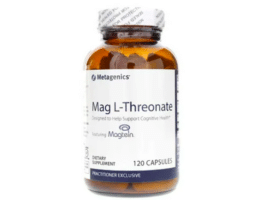Last updated on June 3rd, 2021 at 08:26 am
Today we’re doing a Q&A with Amy Bowman, PA with SimplyNutrients.com. Thanks for taking the time Amy, let’s jump into all folks need to know about potassium.
1) What is potassium? What does it do and why it’s important to our health?
A. Potassium is the third most abundant mineral in the body and its one of the most interesting as once its inside your body it functions as an electrolyte. What that means is once it is in water it can conduct electricity. This is important as up to sixty percent of an adult body is composed of water1. The human body uses electricity for muscle contractions, nerve signals, fluid balancing and other body processes.
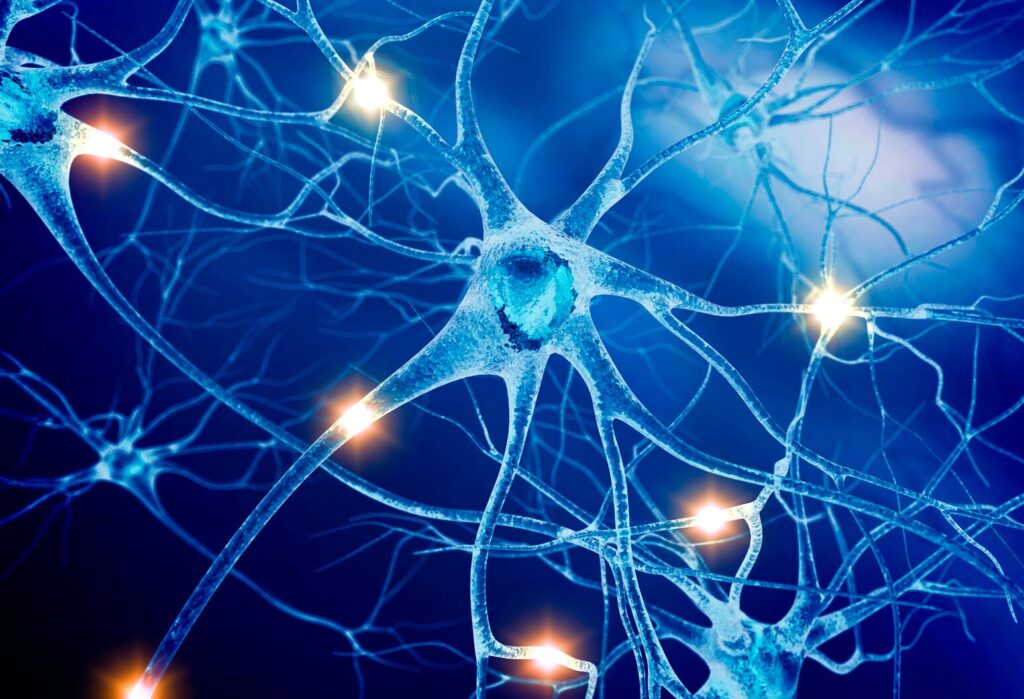
As an example, potassium helps activate the nerve impulses that control your heartbeat, reflexes, and every muscle you use. Lower levels of potassium can cause muscle weakness and, in extreme cases, may cause an irregular heartbeat or respiratory weakness.
The best source of potassium is found in the foods we eat. Someone may have told you to eat a banana before rigorous exercise. Bananas are high in potassium which helps your muscles perform, as well as avoid cramping. Speaking of food and how it can help, a potassium rich diet may reduce blood pressure and water retention, protect against stroke, and help prevent osteoporosis and kidney stones.
High blood pressure affects one in every three Americans and potassium may help reduce high blood pressure by helping the body remove excess sodium. Multiple studies have shown a meaningful reduction in systolic and diastolic blood pressure with an increased potassium intake. In the same way potassium removes sodium, it also increases urine production, which is why potassium has historically been used to treat issues with water retention.
Low potassium can cause kidney stones because it impairs the kidney’s ability to reabsorb calcium, which can lead to a build-up that forms kidney stones.
Osteoporosis is usually associated with aging and reduction in bone mass characterized by hollow or porous bones. It’s often linked with low levels of calcium. Studies have shown that a diet rich in potassium may help prevent osteoporosis by reducing calcium lost through the urine. 2 3
2) Is potassium deficiency common? What percentage of people are deficient?
Potassium is found predominately in fruits and vegetables and many people struggle to get enough of these important foods in their diets. According to the CDC4, only one in ten Americans actually hits their recommended fruit and vegetable targets. This certainly helps explain why potassium deficiency was highlighted as a public health concern in the 2015 – 2020 Dietary Guidelines for Americans5.
3) What are the signs and symptoms of potassium deficiency? Is it possible to have mild, moderate or severe potassium deficiency and if so, do the symptoms change based on the severity?
If you are only temporarily low in potassium you might not feel any symptoms. Once your potassium levels fall below a certain level you might experience weakness, fatigue, muscle cramps, muscle twitches, diarrhea, or heart arrhythmias (abnormal heart rhythms, some of which are very severe). The symptoms you experience will depend on how deficient you are in potassium and it can affect individuals differently. Low potassium can also affect your kidneys which may mean you have to go to the bathroom more often or you may also feel thirstier. The heart or respiratory systems may only be affected in severe cases of potassium depletion.
4) What is the daily recommended intake of potassium?
The daily recommended dose of potassium depends on your age and sex.6 (see chart from the national institutes of health below). For many years, potassium wasn’t listed on the Nutrition Facts of food labels, but starting in January of 2020, all food manufacturers are required to list the potassium content of food products which should make it easier to track for consumers.
| Age | Male | Female | Pregnant | Lactating |
| Birth to 6 months | 400 mg | 400 mg | ||
| 7-12 months | 860 mg | 860 mg | ||
| 1-3 years | 2,000 mg | 2,000 mg | ||
| 4-8 years | 2,300 mg | 2,300 mg | ||
| 9-13 years | 2,500 mg | 2,300 mg | ||
| 14-18 years | 3,000 mg | 2,300 mg | 2,600 mg | 2,500 mg |
| 19-50 years | 3,400 mg | 2,600 mg | 2,900 mg | 2,800 mg |
| 51+ years | 3,400 mg | 2,600 mg |
5) What are some of the common causes of potassium deficiency? Are certain people at greater risk?
The most common cause is excessive potassium loss in urine due to prescription medications that increase urination such as water pills or diuretics. These medications are often prescribed for people who have heart disease or high blood pressure. Some medications such as ACE inhibitors can actually raise potassium levels so it’s important to talk to your doctor to ensure you know and understand what you’re taking and how it may affect your potassium levels.
Conditions such as kidney disease or excessive alcohol use can also significantly lower potassium. Other common causes of potassium deficiency are diarrhea, excessive laxative use, excessive sweating, folic acid deficiency and vomiting. If you have one of the conditions or are taking medications mentioned above its recommended that you talk to your doctor to see if you need periodic testing of your potassium and kidney functions.
6) What symptoms should someone go to a doctor for?
Individuals should see a doctor if they are experiencing irregular heartbeats (arrythmia), severe muscle weakness that does not resolve, or any kind of severe breathing difficulties. The body’s natural stress response releases epinephrine, which drives potassium into the cells potentially worsening any type of pre-existing potassium shortages. Those who have experienced extreme stress should keep this in mind.
7) How does a doctor diagnose potassium deficiency?
Potassium levels are checked using a blood test. The normal range is 3.7 to 5.2 mEq/L (milliequivalents per liter). Common causes of potassium deficiency may provide clues such as eating disorders, diarrhea, vomiting, laxative overuse, or medicines such as diuretics may all cause deficiencies in potassium. Certain antibiotics in larger does, such as penicillin and ampicillin, can cause the body to excrete potassium and therefore be deficient. Individuals with high blood pressure, heart disease, kidney disease, primary aldosteronism (hormonal disorder leading to high blood pressure) are more susceptible to potassium deficiencies.7
8) How is potassium deficiency treated? What’s the upper tolerable intake limit of potassium?
Potassium deficiencies are usually treated by oral supplements but in extreme cases can be treated with through an IV. Tolerable levels of potassium depend on an individual’s age and gender and its highly recommended that you consult with a physician or nutritionist prior to taking potassium supplements. Having too much potassium can be dangerous. A hormone called aldosterone tells the kidneys when to remove potassium. Diseases that lower the production of this hormone such as Addison’s disease can lead to toxic levels of potassium in the blood. Since Potassium affects the way your heart muscle works too much potassium may cause it to beat irregularly and increase your risk of a cardiac arrest.
9) What are some foods high in potassium?
You’re much better off getting potassium from foods instead of potassium supplements. Many fruits and vegetables are rich in potassium, including spinach, sweet potatoes, spinach, citrus juices, cantaloupe, bananas, fish and avocado.
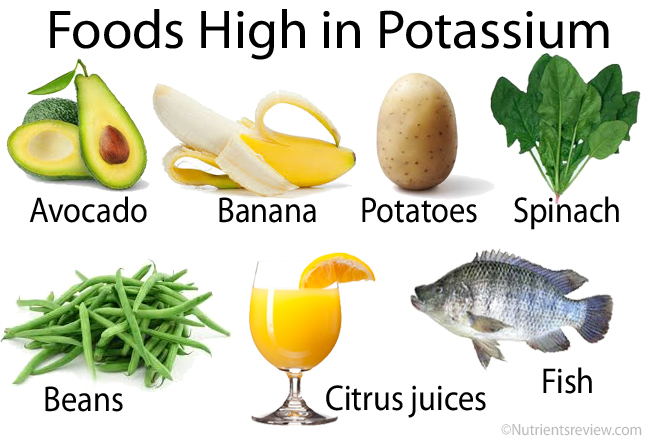
Juices from potassium rich foods such as orange, tomato, prune, apricot and grapefruit juice are excellent sources also. Beans or legumes that are high in potassium include lima beans, pinto beans, kidney beans, soybeans, and lentils. If beans aren’t your thing, leafy greens, zucchini, cucumbers, peas, mushrooms, and cooked broccoli also make the list. If none of that floats your boat, there are nuts, brown rice, wild rice, bran cereal, molasses and whole wheat bread and pasta to choose from. Fish including halibut, cod, trout, rockfish, and tuna can also be good sources.
10) Should someone who is deficient take a supplement? If yes, what dosage?
If a physician has identified someone as deficient in potassium and that individual is unable to get enough potassium by diet change alone, a supplement may be the most effective solution. Supplementation should be done under the care of a doctor or nutritionist as too much potassium can also be problematic. Dosing is done according to the individuals age and gender, in addition to the severity of the hypokalemia (low potassium) based on recommendations by the national institute of health. There are a few supplement options below that are worth looking into further.
Potassium Magnesium (Citrate) 180’s by Pure Encapsulations
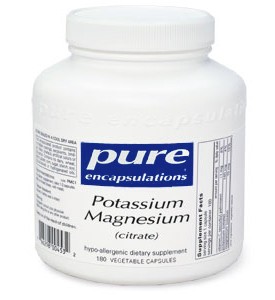
This supplement is a more convenient source of two essential nutrients than foods like citrus fruits‚ leafy green vegetables‚ and bananas. Take one to four capsules daily‚ in divided doses with meals. At the recommended dosage‚ each 180-capsule bottle of Pure Encapsulations’ Potassium Magnesium Citrate should last from 45 days to six months. More Information
Mg/K Aspartate by Metagenics
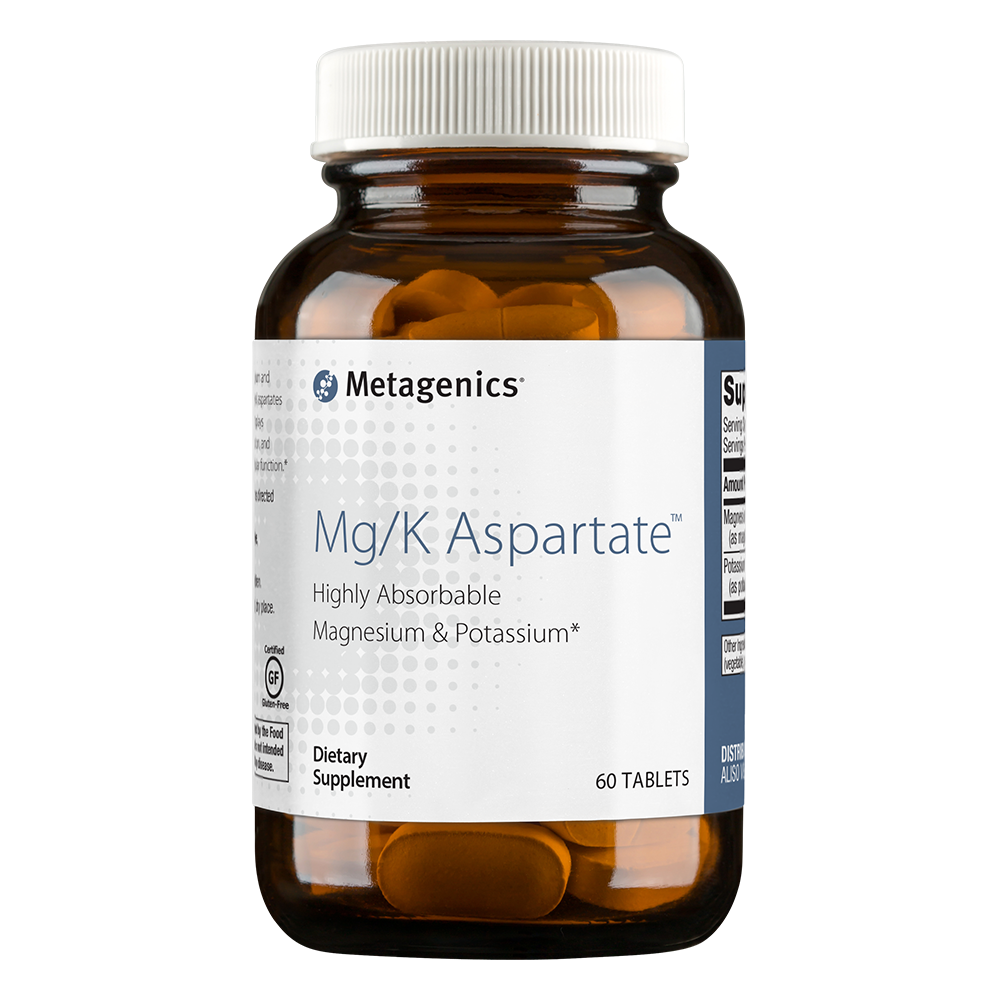
This supplement is a more convenient source of two essential nutrients than foods like citrus fruits‚ leafy green vegetables‚ and bananas. Take one to four capsules daily‚ in divided doses with meals. At the recommended dosage‚ each 180-capsule bottle of Pure Encapsulations’ Potassium Magnesium Citrate should last from 45 days to six months. More Information
REFERENCES:
- USGS – The Water in You: Water and the Human Body
https://www.usgs.gov/special-topic/water-science-school/science/water-you-water-and-human-body?qt-science_center_objects=0#qt-science_center_objects - The effect of supplementation with alkaline potassium salts on bone metabolism: a meta-analysis
https://www.healthline.com/nutrition/what-does-potassium-do#TOC_TITLE_HDR_6 - PubMed.gov – Low dietary potassium intakes and high dietary estimates of net endogenous acid production are associated with low bone mineral density in premenopausal women and increased markers of bone resorption in postmenopausal women
https://pubmed.ncbi.nlm.nih.gov/15817873/ - Only 1 in 10 Adults Get Enough Fruits or Vegetables
https://www.cdc.gov/media/releases/2017/p1116-fruit-vegetable-consumption.html - Dietary Guidelines for Americans 2015 – 2020
https://health.gov/sites/default/files/2019-09/2015-2020_Dietary_Guidelines.pdf - Mayo Clinic – Low potassium (hypokalemia)
https://www.mayoclinic.org/symptoms/low-potassium/basics/causes/sym-20050632 - NIH
https://ods.od.nih.gov/factsheets/Potassium-HealthProfessional/
NOTHING IN THIS WEBSITE IS INTENDED AS, OR SHOULD BE CONSTRUED AS, MEDICAL ADVICE. ANY HEALTHCARE AND/OR NUTRITIONAL MATERIAL CONTAINED IN THIS WEBSITE IS FOR CONSUMER INFORMATIONAL AND EDUCATIONAL PURPOSES ONLY. SUCH MATERIAL IS NOT INTENDED AS MEDICAL ADVICE FOR CONDITIONS OR TREATMENT, NOR IS IT INTENDED AS A SUBSTITUTE FOR A MEDICAL EXAMINATION BY A HEALTHCARE PROFESSIONAL. CONSUMERS SHOULD CONSULT THEIR OWN HEALTH CARE PROFESSIONALS FOR INDIVIDUAL MEDICAL RECOMMENDATIONS.
- Magnesium Threonate: An Honest Buying Guide for Health Enthusiasts - March 21, 2024
- Magnesium Citrate Vs Glycinate: 5 Key Differences And Benefits - March 14, 2024
- How to Pick the Best Magnesium Glycinate Supplement for You - March 7, 2024

